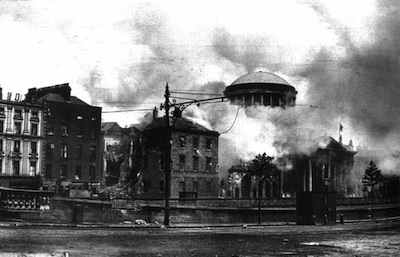
British Army artillery crews were used to bombard the Four Courts in Dublin in the opening battle of the Irish Civil War, according to a recently unearthed memoir.
The revelation contradicts “official” accounts that Michael Collins refused British offers of soldiers to end the three-month occupation of the Four Courts by republican forces opposed to the Anglo-Irish Treaty.
The memoir of Lance Bombardier Percy Creek, Royal Field Artillery, was found by Open University academic William Sheehan and broadcast by BBC Radio this week.
In it, Creek recounts how his unit of howitzer artillery was sent to Fermanagh, but later told to march by night to Dublin in 1922 and “told not to speak to anyone and to keep as quiet as possible”.
Up to then, the Irish National Army had fired only shrapnel rounds into the Four Courts, then held by forces opposed to the 1921 Treaty with Britain, which brought about the partition of the state.
Creek’s unit, according to a memoir now held by the British Imperial War Museum, waited until they were given the orders to fire, before unleashing two rounds of heavy artillery.
“[We] then saw the shell rip into a wall of one of the courts. Then, all became quiet and I think the officers and dignitaries were all very tense,” he recounts.
“We only fired two rounds and quickly limbered up and went back to the rest of the battery,” said the first World War veteran, who described the situation in Dublin as “very tricky”.
The artillery strike helped to defeat the men led by patriot Rory O’Connor.
“A few days later we went to some docks and the whole battery was shipped back to Fishguard,” he remembered in an account that was likely written in the 1960s or 70s.
Creek recalled that his sergeant and commanding officer were worried beforehand because of the presence of Irish soldiers in the British Army unit. “The Irish are temperamental people,” he said.
In response to rumours at the time, the pro-Treaty regime vehemently denied that British soldiers had been involved in the Four Courts bombardment.
The Creek memoir is significant, William Sheehan said because it shows “that the agenda was being driven by the British cabinet in London”.
British Ministers including Winston Churchill, were concerned that anti-Treaty forces in Munster and elsewhere would mobilise to surround pro-Treaty troops encircling the Four Courts.
Collins was “not in control of what was going on around him. He’s choiceless. He is essentially doing what the British wanted”, said the Nottingham-based academic.
![[Irish Republican News]](https://republican-news.org/graphics/title_gifs/rn.gif)
![[Irish Republican News]](https://republican-news.org/graphics/title_gifs/harp.gif)

